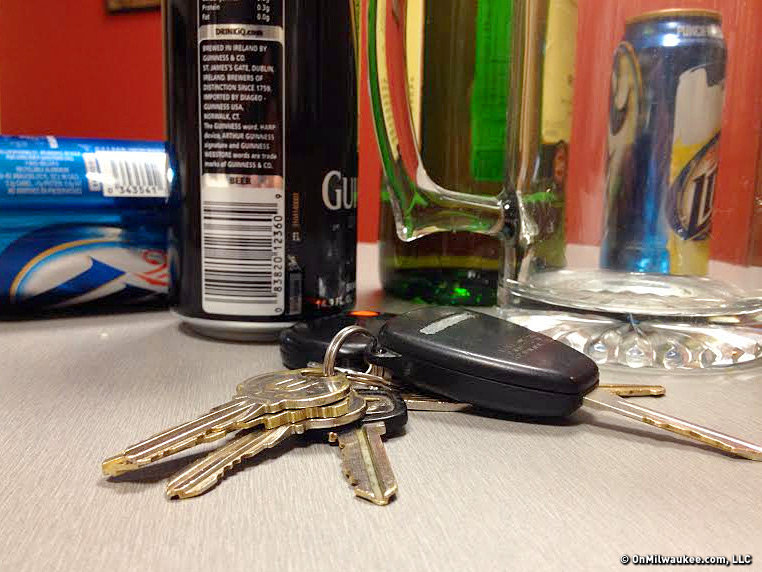"Bar Month" at OnMilwaukee.com – brought to you by Absolut, Avion, Fireball, Pama, Red Stag and 2 Gingers – is back for another round! The whole month of February, we're serving up intoxicatingly fun articles on bars and clubs – including guides, the latest trends, bar reviews, the results of our Best of Bars poll and more. Grab a designated driver and dive in!
A little over nine months ago, Rep. Jim Ott (R-Mequon) and Sen. Alberta Darling (R-River Hills) once again broached the topic of bringing Wisconsin into line with the other 49 states in the union and criminalize a first offense of drunk driving with the caveat that the offender have a blood alcohol content of 0.15 – nearly two times the legal limit – but the measures went nowhere.
The primary concerns lawmakers expressed publicly about supporting criminalization of the first offense centered on funding, with prison space and enforcement being of chief concern.
Since introducing that bill last May, Ott continued to strip away parts of it to the point where on Nov. 5 the assembly, in a bi-partisan vote, passed a measure that would make a second offense a misdemeanor and a fourth offense a felony.
And there it has remained, with no action yet from the Senate.
The experience once again shines a light on the drinking culture much of the Wisconsin population, and, therefore, its representatives, embrace and vigorously defend.
Last year marked the 10th anniversary of the state lowering of the legal limit from .10 to .08, which was only signed into law under the threat of about $150 million in federal highway funding being cut.
While the National Transportation Safety Board has recently suggested lowering the legal limit even further to .05, the fight in Wisconsin has turned squarely to the criminalization of first-time offenders, and more severely punishing repeat offenders.
"How do you eat an elephant one spoonful at a time? We’re not going to totally wipe (drunk driving) out with one piece of legislation or anything like that, so I’m trying to reduce the number of people by changing behavior," said Milwaukee County Sheriff David Clarke, Jr. "Criminalizing the first offense is going to do that."
What is interesting is there is a slight disconnect between lawmakers, law enforcement and advocacy groups like Mothers Against Drunk Driving (M.A.D.D.) on what criminalization could mean in Wisconsin.
Frank Harris, the State Legislative Affairs Manager out of M.A.D.D.’s national office in Washington, D.C., is a Milwaukee native and knows what the culture is like, and what the politics are in Wisconsin.
It’s why M.A.D.D. is pushing for an alternative form of criminalization – the ignition interlock for first offenders at a certain blood alcohol content (BAC).
"I agree with (Clarke) on that (it’s illegal) at .08, just in the sense that M.A.D.D. believes drunk driving is a crime," Harris said. "But, realistically speaking, what has a better chance of passing the legislature? A bill criminalizing the first offense, which was introduced – a version of it was introduced in the assembly but it was sliced and diced – that’s not going to happen in Wisconsin just because of the mindset that everybody gets a free pass. Well, it just takes one free pass to kill somebody."
"That’s why this interlock might be a better medium because, at least what we’re thinking of, is for a first offender between a .08 and a 0.14, if they want to drive, the only way you can do so is on an interlock with a license suspension as opposed to what’s currently happening, which is a work restricted license or time-restricted license, which is unenforceable and makes no sense."
Conversely, Clarke disagrees that an interlock would be a proper deterrent.
He said it’s up to the offender to arrange installation and show the court proof that it has been done, and having law enforcement follow up on such matters can be counterproductive. Clarke added that offenders who wish to avoid installation, or drive on a revoked license, will do so regardless.
"What we need is a behavior change," Clarke said. "A person who is on their third, fourth, fifth, sixth, seventh offense, the multiple-time drunk driver, is beyond being a social drinker and we know that. So, I want to focus on the first two, remove that segment of the driving population that engages in that and then move forward to other things."
To counteract the argument that more prisons will be required, the sheriff feels that significant jail time isn’t necessary on a first offense – a misdemeanor would be deterrent enough. The threat of that conviction would affect those who can’t afford to have even that on their record, and change their decision making.
The sheriff felt that change in the law, along with the elimination of felony qualifiers, such as waiting for a fourth offense in five years, and more streamlined sentencing, would seriously curtail drunk driving.
"I’m trying to remove all of those qualifiers and caveats, again, to educate the public and make them realize that the talk about how serious the state takes drunk driving is (backed up) by action," he said. "We see the ads, we hear the threats that police are cracking down in drunk driving in the state of Wisconsin, and that doesn’t really seem to be the case. So it’s kind of like a toothless tiger, is what I’m working with here and that’s not helping."
What M.A.D.D says has helped has been the enforcement of the .08 legal limit since 2003. The number of drunk driving-related fatalities have fallen from an average of 310 over the four-year period 2000-03 to an average of 250 in the years 2004-12 (the drop in the legal limit became effective on Sept. 30, 2003).
In 2012, there were 23 fatal, alcohol-related crashes in Milwaukee County alone, an additional 241 that resulted in injury and 496 that resulted in property damage.
While Clarke and the Tavern League of Wisconsin don’t believe the drop from .10 to .08 has directly reduced drunken driving – Clarke said the average blood alcohol content of his department’s drunk driver arrests is .15 – Harris and M.A.D.D. do feel it’s had a positive result.
Pete Madland, executive director of the Tavern League, disagreed.
He then pointed to the same statistics as proof that the enforcement of current laws has been effective.
"I think it’s important to know that last year was the safest year in 70 years on Wisconsin highways, since they’ve been keeping track – people don’t talk about that," Madland said. "The things that are in place are working. We are down, since 2003 to 2012, for alcohol-related crashes. They’re down 44 percent. And fatalities are down 36 percent. In the last five years fatalities are down 30 percent."
"So, we’re heading in the right direction and I think that is an indication that the laws that are in place are working."
Madland is not sure the criminalization of a first offense will reduce that factor, and says that while 49 other states do just that, sometimes those charges are pled out anyway. Madland believes having to pay the fines (without negotiation), having a license revoked, having to apply for an occupational license, taking classes and seeing a rise in insurance is enough of a penalty.
"We don’t think that not having a first offense criminalization is an indication that we’re soft on drunk driving because the first time is not a crime – it’s a very tough penalty in Wisconsin and you don’t plea bargain out of it," Madland said. "You get stuck with it. I have no problem defending that we don’t need first time criminalization."
M.A.D.D. and Clarke disagree.
Harris said time and occupational restricted licenses are essentially unenforceable and Clarke feels all of the sentencing loopholes and penalties of fines and classroom attendance encourage people to get behind the wheel while impaired.
"To continually get below 200 drunk driving deaths in Wisconsin, what needs to happen is a fundamental change in how lawmakers treat first offenders," Harris said. "And seeing that criminalizing a first offense is a no-go, then at least change the current licensing requirements, or temporary licensing requirements for a convicted drunk driver who wants to drive following an OWI."
"That should get the Tavern League’s stamp of approval because it’s not technically mandatory. Unless they still want to keep the status quo of a geographic or time-restricted license for a convicted drunk driver, which is just not working."
Clarke added: "Incremental change is what I’m looking for and right now what I’m seeing is cosmetic change, a lot of sabre rattling, moving down to a fourth for a felony but within five years and they’re talking about moving to a third but with 10 years and all that stuff is just theater," he said. "We need to just say hey, first offense, misdemeanor, and we’ll see what happens after that."
"I’m not asking for a whole laundry list of changes. Again, I keep coming back to this. Why is Wisconsin the only state in the nation that doesn’t think a first offense of drunk driving should be a misdemeanor? It just makes no sense."
The sheriff, M.A.D.D. and the Tavern League all agree that repeat offenders should be punished harshly – "I think it’s important to know, and what the sherriff doesn’t know, is we’ve never opposed any legislation that, what we think, attacks the problem, which are repeat offenders and high BAC offenders. We’ve always supported that stuff," Madland said – the disconnect comes in the form of stopping repeat offenders from becoming just that by punishing them the first time around.
Law enforcement, advocacy groups and some state lawmakers are in agreement that that needs to happen, but when, and how, may still take years to decide.
"We have a culture of drinking around here that’s been historic," Clarke said. "You look at the breweries. We’re the number one consumer of brandy. Most of what we do in Wisconsin is centered around some sort of drinking. There’s nothing wrong with that. I don’t advocate for absolute sobriety in our drunk driving laws. I ask people to drink responsibility."
"Most people, fortunately, know what that is, but there is a significant amount of the population that doesn’t. And they engage in the risk."
Jim Owczarski is an award-winning sports journalist and comes to Milwaukee by way of the Chicago Sun-Times Media Network.
A three-year Wisconsin resident who has considered Milwaukee a second home for the better part of seven years, he brings to the market experience covering nearly all major and college sports.
To this point in his career, he has been awarded six national Associated Press Sports Editors awards for investigative reporting, feature writing, breaking news and projects. He is also a four-time nominee for the prestigious Peter J. Lisagor Awards for Exemplary Journalism, presented by the Chicago Headline Club, and is a two-time winner for Best Sports Story. He has also won numerous other Illinois Press Association, Illinois Associated Press and Northern Illinois Newspaper Association awards.
Jim's career started in earnest as a North Central College (Naperville, Ill.) senior in 2002 when he received a Richter Fellowship to cover the Chicago White Sox in spring training. He was hired by the Naperville Sun in 2003 and moved on to the Aurora Beacon News in 2007 before joining OnMilwaukee.com.
In that time, he has covered the events, news and personalities that make up the PGA Tour, LPGA Tour, Major League Baseball, the National Football League, the National Hockey League, NCAA football, baseball and men's and women's basketball as well as boxing, mixed martial arts and various U.S. Olympic teams.
Golf aficionados who venture into Illinois have also read Jim in GOLF Chicago Magazine as well as the Chicago District Golfer and Illinois Golfer magazines.







